
Ever felt like your target is constantly shifting, leaving you struggling to hit the mark? You are not alone. According to PMI, 37% of projects fail due to unclear objectives, costing businesses billions annually. This article equips you with actionable insights to select the right project management methodology and achieve your project goals. The elusive nature of 'project goals' is a challenge familiar to many. Stakeholders frequently revise objectives in the swiftly changing business landscape to ensure optimal project value. Meanwhile, organizations grapple with delivering an expanding portfolio of projects and programs while managing constrained budgets and resources. The result? Project failure emerges as an all-too-common outcome. Amidst technology's rapid shifts and the evolving global workforce, project management has become a complex and time-consuming endeavor. This article outlines the types of project management methodologies and the importance of leveraging the right methodology to help you achieve your project goals.
Why Do We Need Project Management Methodologies?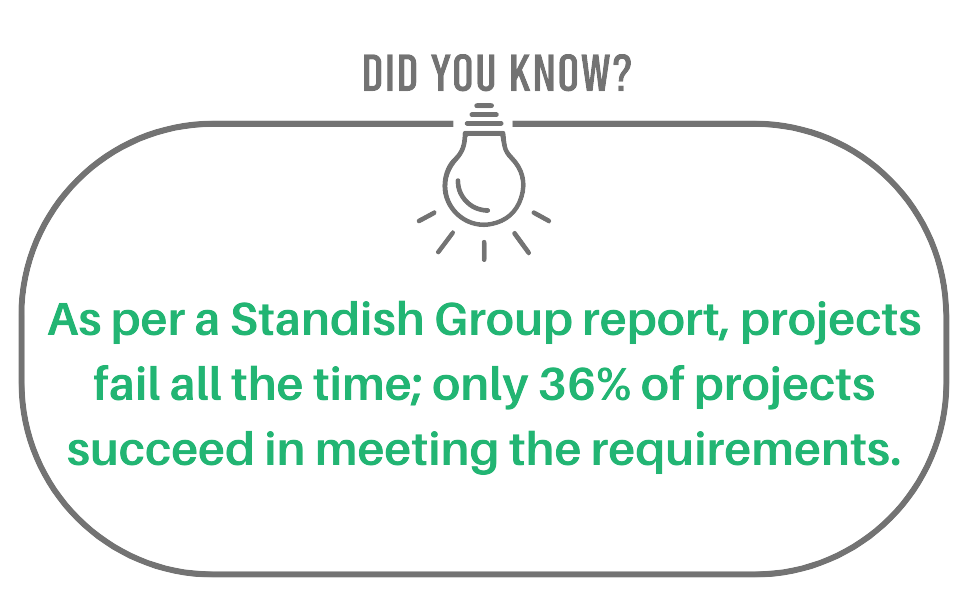
"Do we really need project management methodologies?" Many organizations struggle to see their value, questioning if structured approaches are worth the cost. They inquire, "Isn't it easier to direct our team and oversee them ourselves? It seems more cost-effective."
They genuinely question the necessity of project management because, on the surface, it seems like an extra layer of cost and complexity. Because they are not directly involved in producing tangible outcomes, project leaders may appear to be impeding the team's development.
And if all that is true, why should enterprises consider project management?
Well, the truth is that running projects without good project management and frameworks is a false economy. These perceptions fail to account for the immense value project leaders bring to navigating complex processes and teams and ensuring progress. Project success hinges on implementing the right methodologies, leveraging smart analytics, and having an efficient project leader. This powerful combination forms a trident that can propel your project toward success. A 2023 PMI survey revealed that organizations with standardized project management frameworks complete 28% more projects successfully than those without
The key lies in recognizing that excluding robust project management methodologies is a misstep with costly consequences. The rapidly changing world demands swifter project deliveries than the typical two- to -five-year span. The evolution of initial project requirements during this period can make efforts unproductive. The success of any project hinges on selecting the right methodology from the outset. However, the plethora of methodologies available today can be overwhelming. Industry disruptions triggered by digital transformation underscore the need to reassess methodologies to align with new goals and mitigate risks.
Below is an illustration based on IT industry responses from the 2018 PMI Pulse survey collated by Kissflow. This edition features insights from 4,455 project management practitioners, 447 senior executives, and 800 PMO directors across various industries, including government, IT, telecom, energy, manufacturing, healthcare, and construction. Respondents represent North America, Asia Pacific, EMEA, and Latin America.
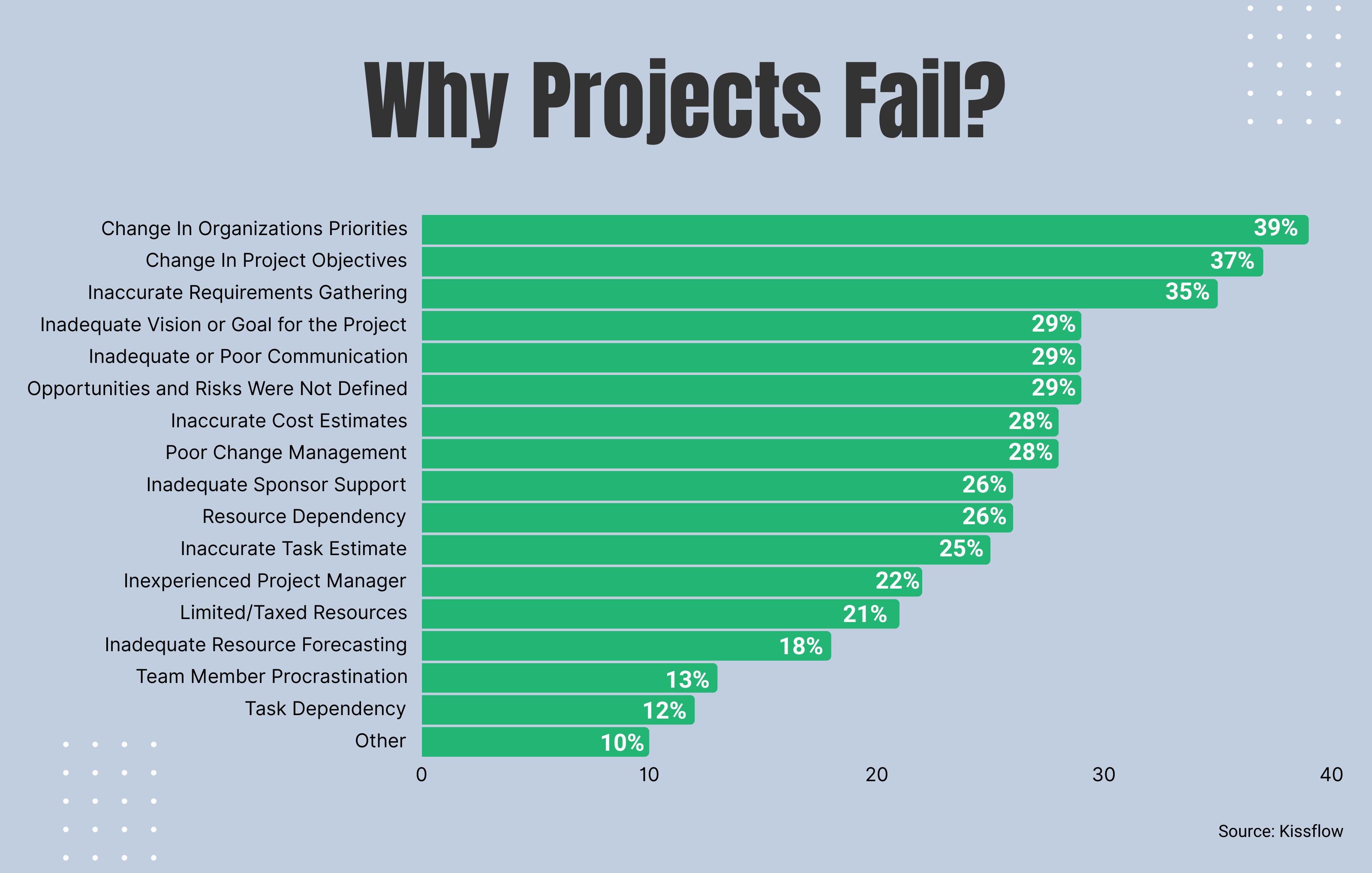
What Are Project Management Methodologies?
A project management methodology comprises principles, tools, and techniques for planning, executing, and overseeing projects. For example, Agile is widely used in IT and creative industries for its adaptability, while Waterfall suits traditional sectors like construction for its structured approach. Essential in modern businesses, it ensures projects align tightly with innovation. These methodologies empower project leaders to lead, collaborate, and manage work effectively. Various methodologies exist, each with its merits and drawbacks, suited for specific industries or projects. Familiarizing yourself with these methodologies is crucial to selecting the right fit. Project management's essence lies in achieving results and recognizing organizational nuances. Thus, project leaders must grasp unspoken influences. Applying a suitable methodology assures timely, budget-conscious, and quality-driven project completion.
Types of Project Management Methodologies and Frameworks
No one-size-fits-all method works across business types, sizes, or industries, so it is important to put some time and effort into choosing the right project management methodology for your project. Project management methodologies and frameworks provide structured approaches to plan, execute, and monitor projects. Here is an overview of the seven best project management methodologies and frameworks:
- Agile Methodology - A collaborative and adaptive approach involving short work phases, frequent testing, and data-driven change. Suitable for industries like software development and creative fields.
- Waterfall Methodology - A linear and sequential approach in which each phase is completed before proceeding to the next. It is commonly used in traditional industries with well-defined requirements.
- Scrum Methodology - A framework emphasizing collaboration, flexibility, and iterative development, Scrum is often used in software development projects.
- Kanban Methodology - This method focuses on visualizing work, limiting work in progress, and ensuring continuous flow. Widely applied in supply chain management, Kanban is also used in service industries to manage operational tasks effectively. It is suitable for projects with continuous delivery and visual management and is commonly used in manufacturing and software development.
- Lean Methodology - A systematic approach to eliminating waste and optimizing efficiency. Primarily used in manufacturing and process improvement projects.
- Six Sigma Methodology - A data-driven approach to improve quality and reduce defects. Applied in industries requiring elevated quality control levels, such as manufacturing and healthcare.
- PRINCE2 Methodology - A structured project management methodology widely used in government and public sector projects.
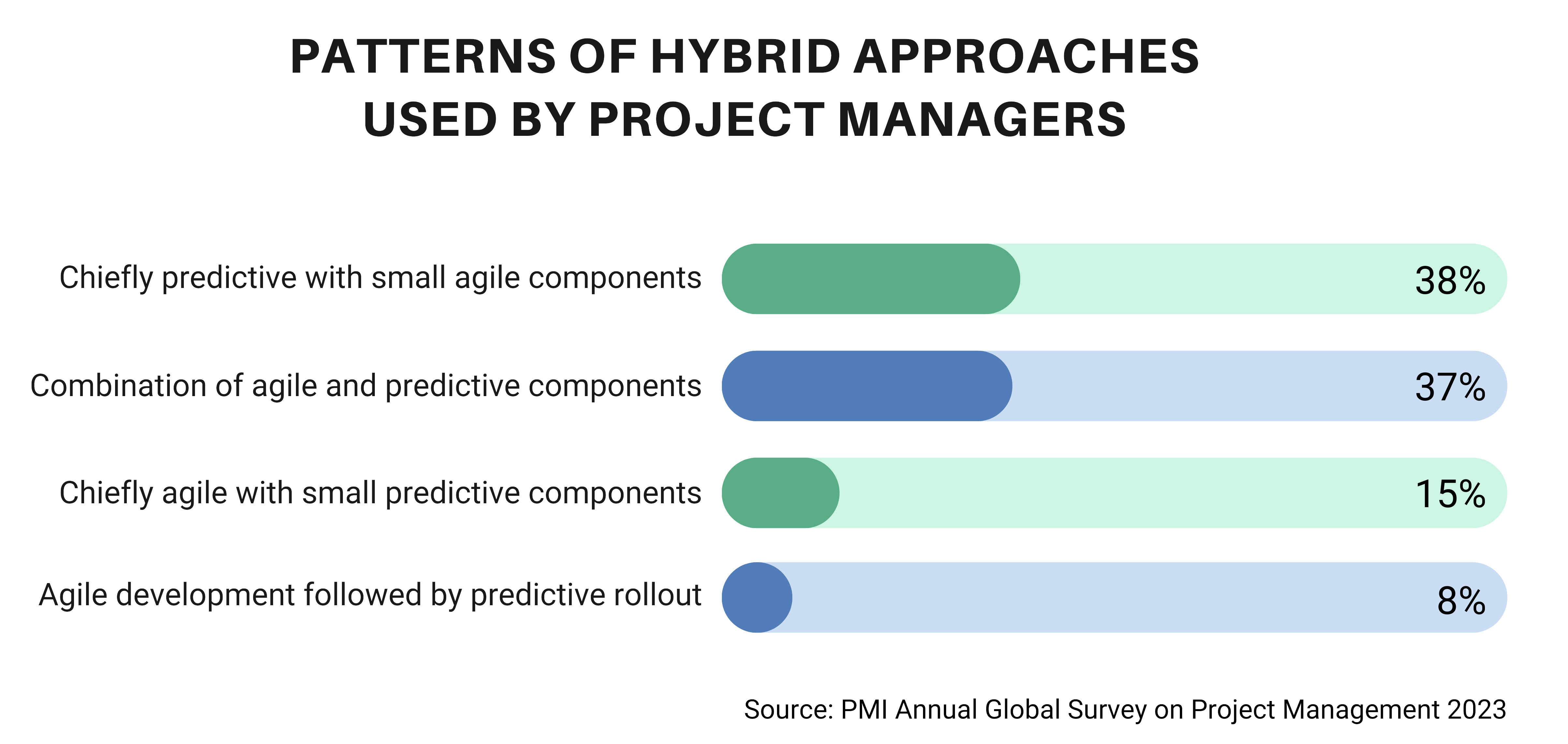
The above illustration is based on PMI Annual Global Survey on Project Management 2023 Report.
These methodologies offer different approaches to project management, and the best fit depends on project requirements, team dynamics, and industry context. It is important to evaluate these methodologies to choose the most suitable one for your project.
How to Choose the Right Methodology or Framework
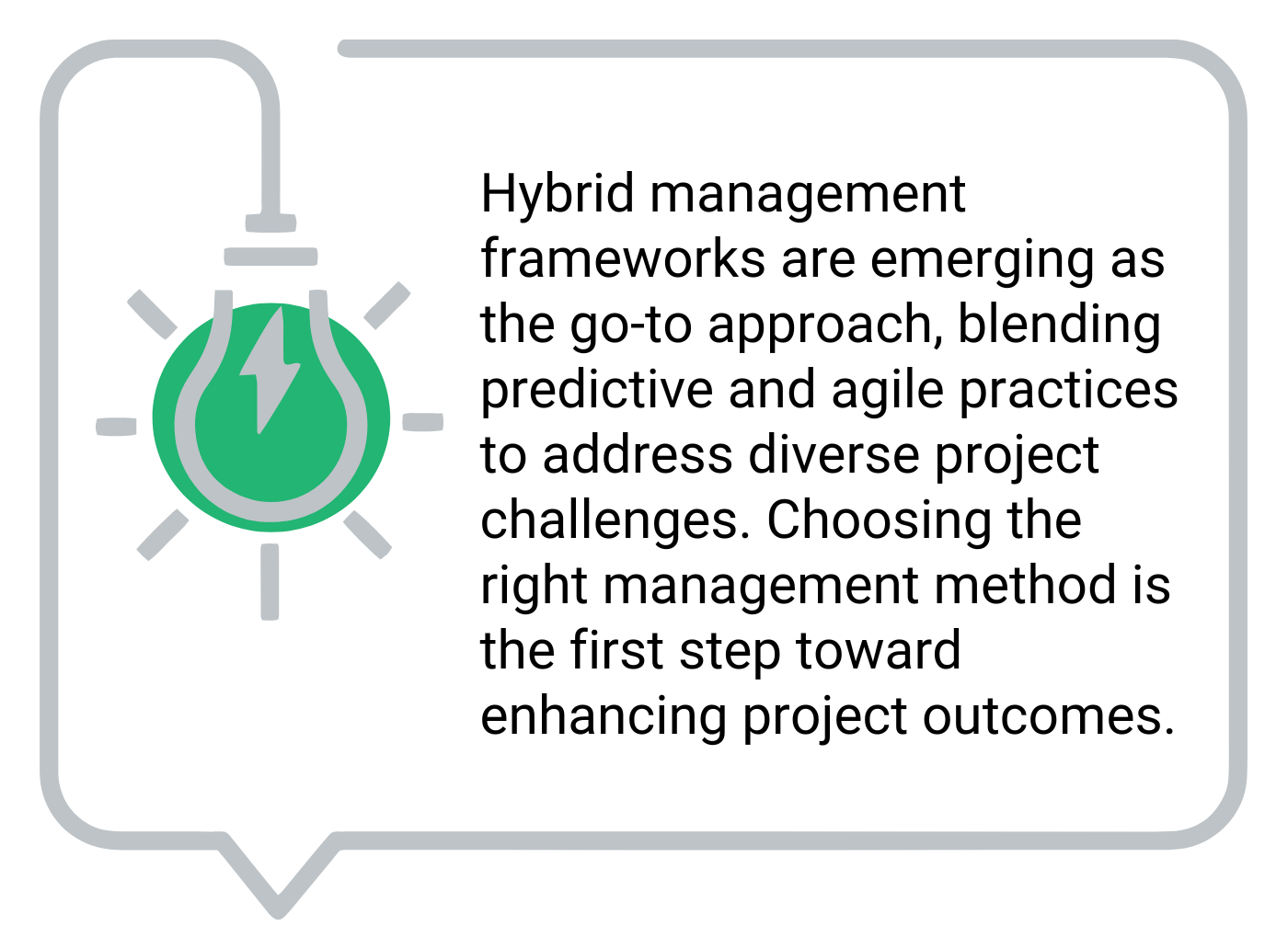 Struggling to decide? Use this simple flow: If your project has flexible goals, choose Agile. For structured deliverables, go for Waterfall. For visual tracking, Kanban works best. Project success depends on choosing the right project management methodology or framework and leveraging predictive analytics to enhance decision-making and risk mitigation. Predictive intelligence solutions can revolutionize project management methodologies by providing real-time insights, enabling proactive decision-making, and optimizing resource allocation.
Struggling to decide? Use this simple flow: If your project has flexible goals, choose Agile. For structured deliverables, go for Waterfall. For visual tracking, Kanban works best. Project success depends on choosing the right project management methodology or framework and leveraging predictive analytics to enhance decision-making and risk mitigation. Predictive intelligence solutions can revolutionize project management methodologies by providing real-time insights, enabling proactive decision-making, and optimizing resource allocation.
They can also help you implement standardized methodologies with robust project governance capabilities, safeguarding your projects from regulatory risks and ensuring uniform compliance. This way, you can enhance your project efficiency and avoid fines. Here are some factors to consider when choosing a methodology or framework:
- Project Requirements - The type of project you are working on will determine the methodology or framework you choose. For instance, Agile methodology is ideal for software development projects, while Waterfall methodology is best suited for industries with unambiguous requirements.
- Team Dynamics - Your team's size and experience will influence the methodology or framework you choose. For instance, the Scrum methodology emphasizes collaboration and flexibility, making it suitable for small, cross-functional teams.
- Industry Context - Different industries have unique requirements and constraints that affect the choice of methodology or framework. For instance, Lean methodology is primarily used in manufacturing and process improvement projects to eliminate waste and optimize efficiency.
- Project Timeline - The project's duration will determine the methodology or framework you choose. For instance, Agile methodology emphasizes short phases of work and frequent testing, making it suitable for projects with tight deadlines.
- Project Budget - Your project's budget and resources will also influence the methodology or framework you choose. For instance, the Critical Chain Project Management methodology suits projects with limited resources and complex dependencies.
- Project Complexity - The complexity of your project will determine the methodology or framework you choose. For instance, the PMBOK methodology is based on the Project Management Body of Knowledge (PMBOK) guide and applies to various industries and projects.
- Team Expertise - Your team's expertise will influence the methodology or framework you choose. For instance, the Six Sigma methodology requires a data-driven approach to improve quality and reduce defects, making it suitable for teams with expertise in data analysis.
Project Management Methodologies: Pros and Cons
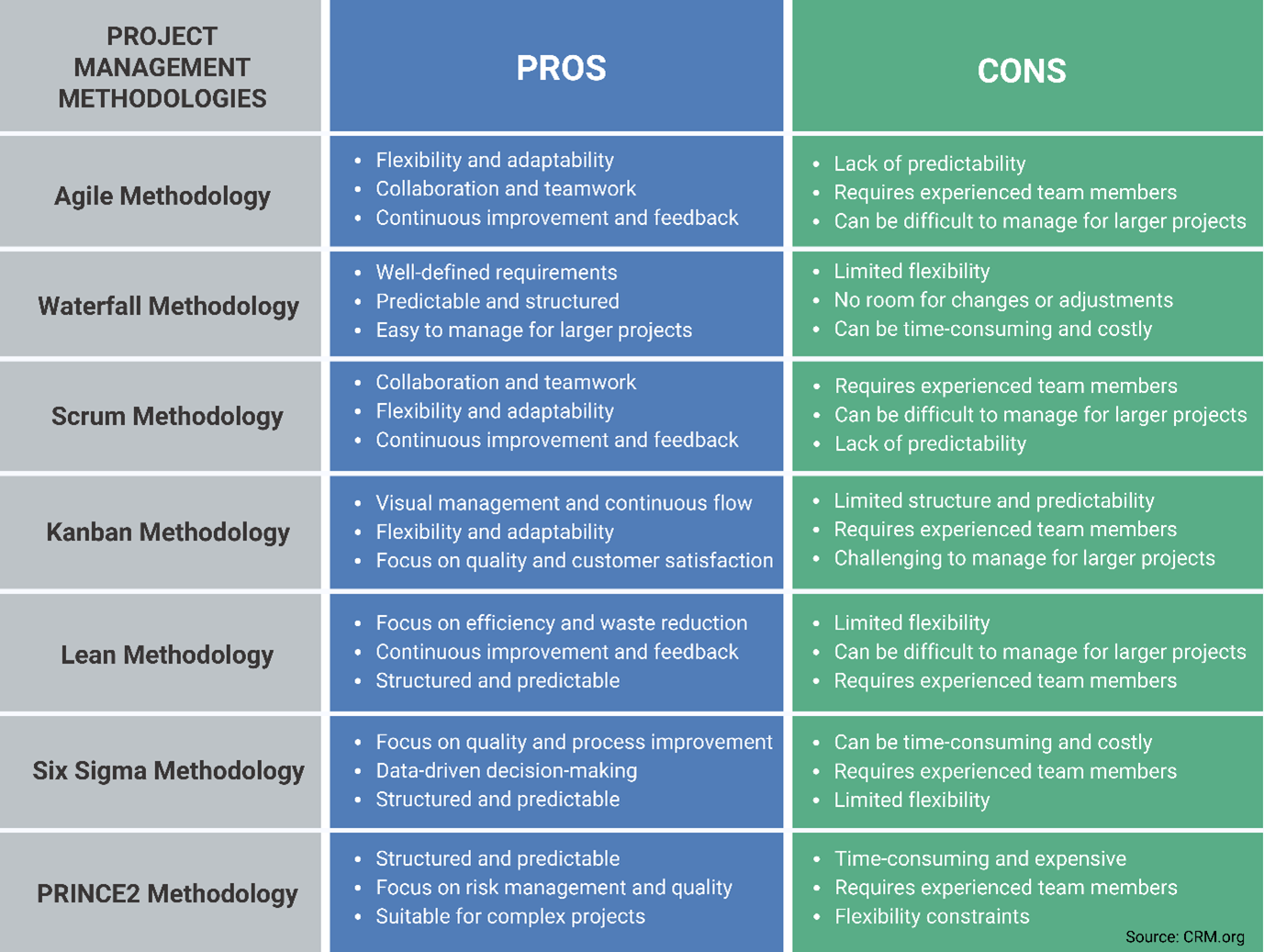
Benefits of Project Management Methodologies
Implementing project management methodologies brings numerous benefits to organizations. Here are some key advantages:
- Organize and Streamline Project Cycles—Project management methodologies provide a structured system for organizing and streamlining project tasks, ensuring clear direction and smooth progress without unnecessary delays. For instance, Lean reduces waste in manufacturing processes, while Agile accelerates software delivery through iterative workflows.
- Automation of Workflows - By adopting project management methodologies, organizations can automate project management workflows, reducing manual intervention and improving efficiency.
- Security Risk Management - Project management methodologies help manage and mitigate security risks associated with projects, ensuring that sensitive information and resources are protected.
- Cost-Benefit Analysis - Project management methodologies allow for cost-benefit analysis of financial and implicit resources, enabling organizations to make informed decisions and optimize resource allocation.
- Alternate Project Delivery Methods - Some methodologies offer opportunistic approaches to project delivery, allowing organizations to explore alternative methods more suitable for specific projects.
- Accelerated Learning Curve - Training teams in advance on project management tools and methodologies speeds up the learning curve, enhancing team productivity and effectiveness.
- Enhanced Collaboration and Team Bonds - Project management methodologies bring teams closer, fostering collaboration, communication, and stronger team bonds.
- Real-Time Client Interaction - Modern tools like TrueProject ensure real-time collaboration, providing clients with up-to-date project status and actionable insights
By leveraging these benefits, organizations can improve project outcomes, increase efficiency, and achieve successful project delivery. Choosing the right methodology that aligns with the organization's goals, project requirements, and team dynamics is important.
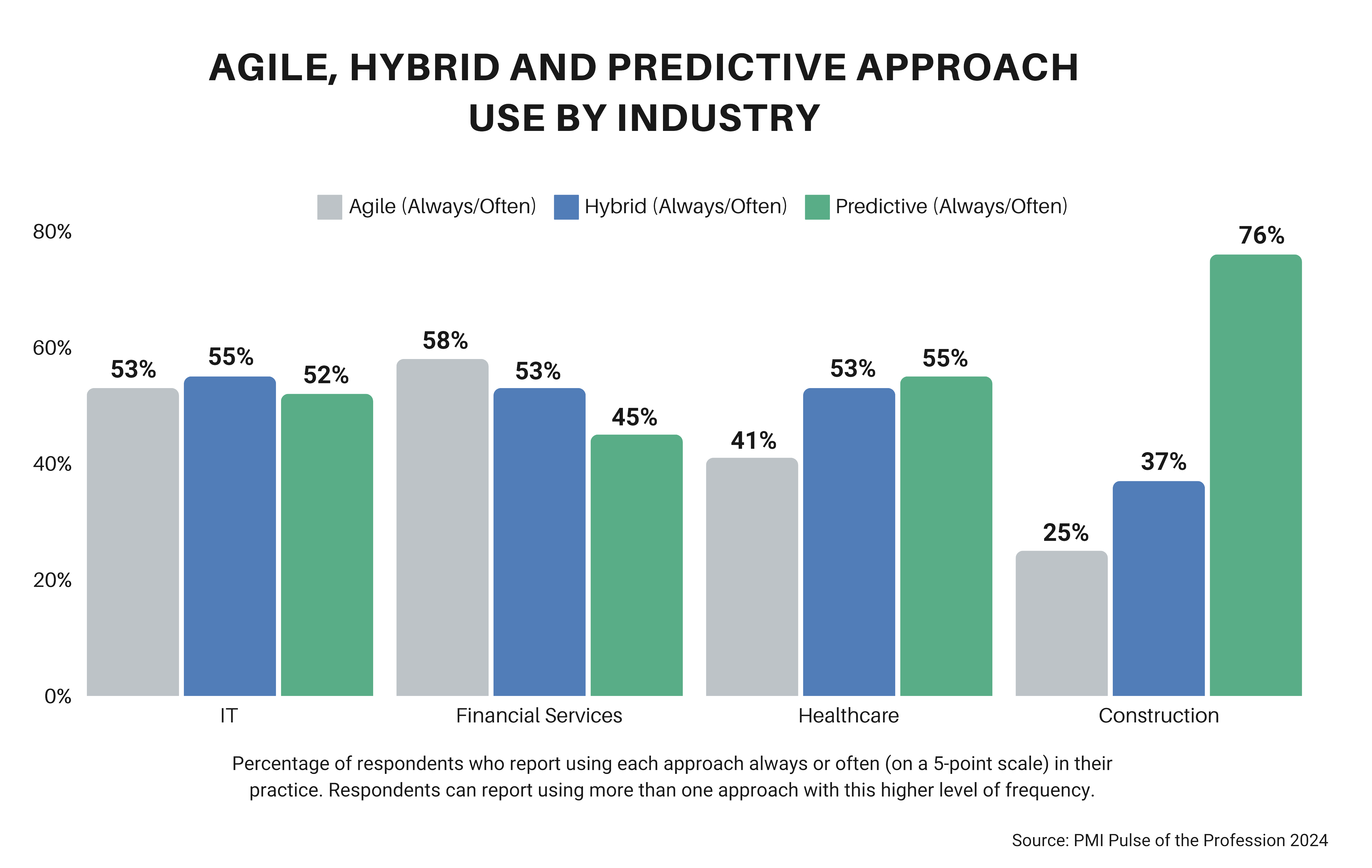
The above illustration is based on PMI Pulse of the Profession 2024 Report.
Choosing the Right Methodology and Approach
With projects, there is no room for error; changing goals and limited resources can often put you in tight spots. This article underscores the pivotal role of project management methodologies and predictive analytics in achieving success amidst change and resource constraints. It stresses the importance of choosing the right methodology, augmented by advanced predictive solutions, to navigate this dynamic terrain and ensure projects not only stay on track but thrive. Making the right project management methodologies, along with modern project management solutions, a powerful catalyst for project success. Overlooking these factors can cause domino effects that will prove costly.
One solution surpassing these contemporary project management systems is TrueProject, a KPI-based predictive project management SaaS solution that excels in improving project health and performance. By delivering automated project oversight and governance, TrueProject leverages advanced analytics for insight, foresight, and hindsight. This allows for proactive risk mitigation, identifying obstacles and opportunities, optimizing project results, and elevating project delivery value. TrueProject's KPI-based approach empowers leaders with customized dashboards, tailored insights, enhanced collaboration, and informed decision-making with real-time insights. It's the ultimate solution for structuring, standardizing, and strengthening your project management methodologies with proper governance, ensuring project success and delivery.
More information on TrueProject can be found at trueprojectinsight.com

About the Author:
Nisha Antony is an accomplished Senior Marketing Communications Specialist at TrueProject, a leader in predictive intelligence. With over 16 years of experience, she has worked as a Senior Analyst at Xchanging, a UK consulting firm, and as an Internal Communications Manager on a major cloud project at TE Connectivity. She is an insightful storyteller who creates engaging content on AI, machine learning, analytics, governance, project management, cloud platforms, workforce optimization, and leadership.
Endnotes:
- Ben Aston. “9 Of The Most Popular Project Management Methodologies Made Simple.” The Digital Project Manager: August 02, 2023. https://thedigitalprojectmanager.com/projects/pm-methodology/project-management-methodologies-made-simple/
- Jason Westland. “Top 10 Project Management Methodologies: An Overview.” Project Manager: November 22, 2021. https://www.projectmanager.com/blog/project-management-methodology
- Asmo. “7 Popular Project Management Methodologies and for What They’re Best Suited.” March 09, 2018. https://zenkit.com/en/blog/7-popular-project-management-methodologies-and-for-what-theyre-best-suited/
- Kissflow Content Team. “Project Management Methodologies and Frameworks Explained.” Kissflow: (n.d.) https://kissflow.com/project/project-management-methodologies-and-frameworks/
- Zeshan Naz. “Project Management Methodologies [10 Popular Frameworks].” KnowledgeHut: August 21, 2023. https://www.knowledgehut.com/blog/project-management/project-management-methodologies
- Michael Scheiner. “Project Management Methodologies Comparison (11 PM Methods).” CRM.org: June 03, 2022. https://crm.org/news/project-management-methodologies
- PMI Team. “Pulse of the Profession 2024 Report.” PMI: 2024. https://www.pmi.org/-/media/pmi/documents/public/pdf/learning/thought-leadership/pmi-pulse-of-the-profession-2024-report.pdf?rev=c480c0b72ee8466eaba10132b614c5d7




